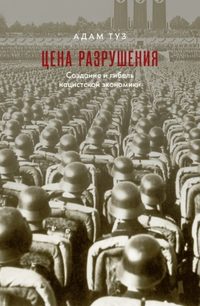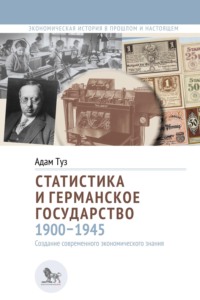
Полная версия
Всемирный потоп. Великая война и переустройство мирового порядка, 1916–1931 годы
55
Как и в предыдущей работе, я многое почерпнул из: M. Berg, Gustav Stresemann. Eine politische Karriere zwischen Reich und Republik (Göttingen, 1992).
56
N. Bamba, Japanese Diplomacy in a Dilemma (Vancouver, 1972), р. 360–366.
57
L. Trotsky, Perspectives of World Development (1924), http: //www.marxists.org/archive/trotsky/1924/07/world.htm; Л. Троцкий К вопросу о перспективах мирового развития. Доклад. 28 июля 1924 г. // Правда. 1924. 5 августа (№ 176), http: // web.mit.edu/fjk/www/Trotsky/Europa/chapter2.html.
58
A. Hitler, Mein Kampf (London, 1939), vol. 2, chapter 13.
59
Здесь я полностью согласен с: R. Boyce, The Great Interwar Crisis and the Collapse of Globalization (London, 2009).
60
Краткое вступление см.: A. Stephanson, Manifest Destiny: American Expansionism and the Empire of Right (New York, 1995).
61
Eisenach, Lost Promise, р. 225.
62
Эта тема в последнее время получила развитие в: D. E. Ellwood, The Shock of America (Oxford, 2012). Более вдумчивую критику см. в: T. Welskopp and A. Lessoff (eds), Fractured Modernity: America Confronts Modern Times, 1890s to 1940s (Oldenbourg, 2012).
63
Вывод, к которому пришел совсем с другой стороны G. Kolko, The Triumph of Conservatism: A Reinterpretation of American History, 1900–1916 (New York, 1963).
64
J. T. Sparrow, Warfare State: World War II Americans and the Age of Big Government (New York, 2011).
65
Douglas Steeples and David O. Whitten, Democracy in Desperation: The Depression of 1893 (Westport, CT, 1998).
66
Лучшим кратким введением остается: A. S. Link, Woodrow Wilson and the Progressive Era 1910–1917 (New York, 1954).
67
W. C. Widenor, Henry Cabot Lodge and the Search for an American Foreign Policy (Berkeley, CA, 1983).
68
B. Knei-Paz, The Social and Political Thought of Leon Trotsky (Oxford, 1978).
69
V. I. Lenin, «The chain Is No Stronger Than Its Weakest Link», Pravda 67, 9 June (27 May) 1917; Lenin: Collected Works (Moscow, 1964), vol. 24, 519–520; В. И. Ленин. Крепость цепи определяется крепостью самого слабого звена // Ленин В. И. Полн. собр. соч. Т. 32. М., 1969, с. 201–202.
70
S. Hoffmann, Gulliver’s Troubles, or the Setting of American Foreign Policy (New York, 1968), р. 52. Другие высказывания политологов о «неравномерном и комбинированном развитии» см. в: R. Gilpin, War and Change in World Politics (Cambridge 1981).
71
В числе недавно изданных работ см.: H. Strachan, The First World War (London, 2003); D. Stevenson, 1914–1918: The History of the First World War (London, 2004).
72
N. A. Lambert, Planning Armageddon: British Economic Warfare and the First World War (Cambridge, MA, 2012).
73
S. Roskill, Naval Policy Between the Wars (New York, 1968 and 1976), vol. 1, р. 80–81.
74
H. Nouailhat, France et Etats-Unis: Août 1914-Avril 1917 (Paris, 1979), р. 349–355.
75
C. Seymour (ed.), The Intimate Papers of Colonel House (London, 1926), vol. 1, р. 312–313.
76
A. S. Link (ed.) et al., The Papers of Woodrow Wilson [hereafter PWW], 69 vols (Princeton, NJ,1966–1994), vol. 36, р. 120.
77
J. J. Safford, Wilsonian Maritime Diplomacy 1913–1921 (New Brunswick, NJ, 1978), р. 67–115.
78
P. O. O’Brian, British and American Naval Power: Politics and Policy, 1900–1936 (West-port, CT, 1998), р. 117.
79
R. Skidelsky, John Maynard Keynes: A Biography, 3 vols (New York, 1983–2000), vol. 1,р. 305–315.
80
K. Burk, Britain, America and the Sinews of War, 1914–1918 (London, 1985); H. Strachan, Financing the First World War (Oxford, 2004).
81
K. Neilson, Strategy and Supply: The Anglo-Russian Alliance 1914–1917 (London, 1984), р. 106–112.
82
M. Horn, Britain, France, and the Financing of the First World War (Montreal, 2002).
83
Nouailhat, France, р. 368.
84
S. Broadberry and M. Harrison (eds), The Economics of World War I (Cambridge, 2005).
85
Классическая работа: H. Feis, Europe: The World’s Banker 1870–1914 (New York, 1965).
86
R. Chernow, The House of Morgan: An American Banking Dynasty and the Rise of Modern Finance (New York, 2001).
87
J. M. Keynes, The Collected Writings of John Maynard Keynes, vol. 16 (London, 1971-89), р. 197.
88
P. Roberts, «„Quis Custodiet Ipsos Custodes?“ The Federal Reserve System» s Founding Fathers and Allied Finances in the First World War’, The Business History Review 72 (1998) р. 585–620.
89
E. Sanders, Roots of Reform (Chicago, IL, 1999); A. H. Meltzer, A History of the Federal Reserve (Chicago, IL, 2002–2003).
90
W. L. Silber, When Washington Shut Down Wall Street: The Great Financial Crisis of 1914 and the Origins of America’s Monetary Supremacy (Princeton, NJ, 2007).
91
N. Ferguson, The Pity of War: Explaining World War I (London, 1998).
92
A. Offer, The First World War: An Agrarian Interpretation (Oxford, 1991).
93
Обзор см. в: D. E. Ellwood, The Shock of America (Oxford, 2012).
94
J. Banno, Democracy in Prewar Japan: Concepts of Government 1871–1937 (London, 2001), р. 47.
95
W. Wilson, Congressional Government: A Study in American Government (PhD thesis, Johns Hopkins University, 1885).
96
D. T. Rodgers, Atlantic Crossings: Social Politics in a Progressive Age (Cambridge, MA,1998).
97
W. Wilson, «Democracy and Efficiency», Atlantic Monthly (March 1901), р. 289.
98
T. Raithel, Das Wunder der inneren Einheit (Bonn, 1996).
99
T. Roosevelt, America and the World War (New York, 1915).
100
J. M. Cooper, The Warrior and the Priest: Theodore Roosevelt and Woodrow Wilson (Cambridge, MA, 1983), р. 284–285.
101
W. Wilson, A History of the American People (New York, 1902), and J. M. Cooper, Woodrow Wilson: A Biography (New York, 2009).
102
PWW, vol. 57, р. 246.
103
W. Wilson, «The Reconstruction of the Southern States», Atlantic Monthly, January 1901, р. 1–15.
104
R. E. Hannigan, The New World Power: American Foreign Policy, 1898–1917 (Philadelphia, PA, 2002), р. 45–48.
105
R. S. Baker and W. E. Dodd (eds), The Public Papers of Woodrow Wilson (New York, 1925–1927), vol. 1, р. 224–225.
106
T. J. Knock, To End All Wars: Woodrow Wilson and the Quest for a New Order (Princeton, NJ, 1992), р. 77.
107
PWW, vol. 37, р. 116.
108
PWW, vol. 40, р. 84–85.
109
PWW, vol. 41, р. 183–184, и еще раз в феврале 1917 г. – см.: ibid., р. 316–317.
110
B. M. Manly, «Have Profits Kept Pace with the Cost of Living?», Annals of the American Academy of Political and Social Science 89 (1920), р. 157–162.
111
M. J. Pusey, Charles Evans Hughes (New York, 1951), vol. 1, р. 335–366.
112
The Memoirs of Marshal Joffre, trans. T. B. Mott (London, 1932), vol. 2, р. 461.
113
P. v. Hindenburg, Aus Meinem Leben (Leipzig, 1920), р. 180–181.
114
G. Ritter, Staatskunst und Kriegshandwerk (Munich, 1954–1968), vol. 3, р. 246.
115
G. E. Torrey, Romania and World War I (Lasi, 1998), р. 174.
116
S. Miller, Burgfrieden und Klassenkampf: Die deutsche Sozialdemokratie in Ersten Weltkrieg (Düsseldorf, 1974), р. 263–264.
117
D. French, The Strategy of the Lloyd George Coalition, 1916-19 (Oxford, 1995); M. G. Fry, Lloyd George and Foreign Policy (Montreal, 1977).
118
Keynes, The Collected Writings (18 October 1916), vol. 16, р. 201.
119
Блестяще изложено в G.-H. Soutou, L’Or et le Sang: Les Buts de guerre économique de la Première Guerre Mondiale (Paris, 1989), р. 365–363, 398–399.
120
Papers Relating to the Foreign Relations of the United States: Lansing Papers (Washington, DC, 1940), vol. 1, р. 306–307.
121
Seymour (ed.), Intimate Papers, vol. 2, р. 129.
122
Fry, Lloyd George, р. 219.
123
Neilson, Strategy and Supply, р. 191; A. Suttie, Rewriting the First World War: Lloyd George, Politics and Strategy 1914–1918 (London, 2005), р. 85.
124
V. I. Lenin, «Imperialism, the Highest Stage of Capitalism», in V. I. Lenin, Selected Works. M.,1963, vol. 1, р. 667–766; В. И. Ленин. Империализм, как высшая стадия капитализма //Ленин В. И. Полн. собр. соч. Т. 27. М., 1969, с. 400.
125
На левом фланге Ленин выступал против теории так называемого ультраимпериализма, см.: K. Kautsky, «Der Imperialismus», Die Neue Zeit 32, no. 2 (1914), р. 908–922. О недавнем возрождении этой теории см.: A. Negri and M. Hardt, Empire (Cambridge, MA, 2001); Хардт М., Негри А. Империя. М., 2004.
126
A. S. Link (ed.) et al., The Papers of Woodrow Wilson [hereafter PWW], 69 vols (Princeton, NJ, 1966-94), vol. 40, р. 19–20. Поучительное ревизионистское описание того, как Америка вступила в войну, см.: J. D. Doenecke, Nothing Less Than War: A New History of America’s Entry into World War I (Lexington, KY, 2010).
127
PWW, vol. 40, р. 77.
128
P. Roberts, „Quis Custodiet Ipsos Custodes?“ The Federal Reserve System’s Founding Fathers and Allied Finances in the First World War’, Business History Review 72(1998) р. 585–620.
129
H. Nouailhat, France et Etats-Unis: Aout 1914-Avril 1917 (Paris, 1979), р. 382.
130
J. Siegel, For Peace and Money (Oxford, 2014), chapter 4.
131
G.-H. Soutou, L’Or et le Sang: Les Buts de guerre économique de la Preminre Guerre Mondiale (Paris, 1989), р. 373–378; J. Wormell, The Management of the Public Debt of the United Kingdom (London, 2000), р. 222–241.
132
J. H. von Bernstorff, My Three Years in America (New York, 1920), р. 317.
133
T. J. Knock, To End All Wars: Woodrow Wilson and the Quest for a New Order (Princeton, NJ, 1992), р. 110. О реакции в России см.: Papers Relating to the Foreign Relations of the United States: Lansing Papers [FRUS: Lansing Papers] (Washington, DC, 1940), vol. 2, р. 320–321.
134
«President Wilson and Peace», The Times (London), Friday 22 December 1916, N9; «French Public Opinion», The Times (London), 23 December 1916, N7.
135
Nouailhat, France, p. 393.
136
D. French, The Strategy of the Lloyd George Coalition, 1916–1918 (Oxford, 1995), p. 34.
137
Ibid., p. 38.
138
J. M. Keynes, Collected Writings of John Maynard Keynes, vol. 16 (London, 1971).
139
The New York Times, 23 January 1917; PWW, vol. 40, p. 533–539.
140
Knock, To End All Wars ближе всех подходит к пониманию этого, но он воспринимает речь не критически, а как манифест прогрессистов. Критическая оценка «новых левых» см.: N. Levin, Woodrow Wilson and World Politics (New York,1968), p. 260.
141
J. Cooper, The Warrior and the Priest: Woodrow Wilson and Theodore Roosevelt (Cambridge, MA, 1983).
142
C. Seymour (ed.), The Intimate Papers of Colonel House (London, 1926), vol. 2, p. 412.
143
PWW, vol. 40 p. 533–539.
144
Bernstorff, My Three Years, p. 390–391.
145
The New York Times, 23 January 1917.
146
PWW, vol. 41, p. 11–12.
147
The New York Times, 23 January 1917.
148
«Labour in Session», The Times (London), 23 January 1917, N5.
149
«War Aims of Labour», The Times (London), 24 January 1917, N7.
150
The New York Times, 24 January 1917.




